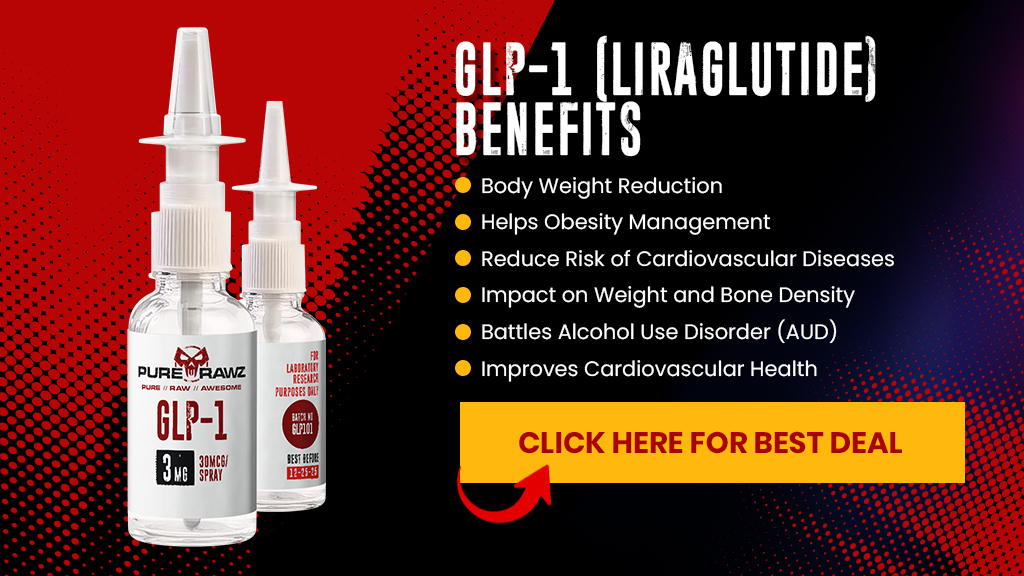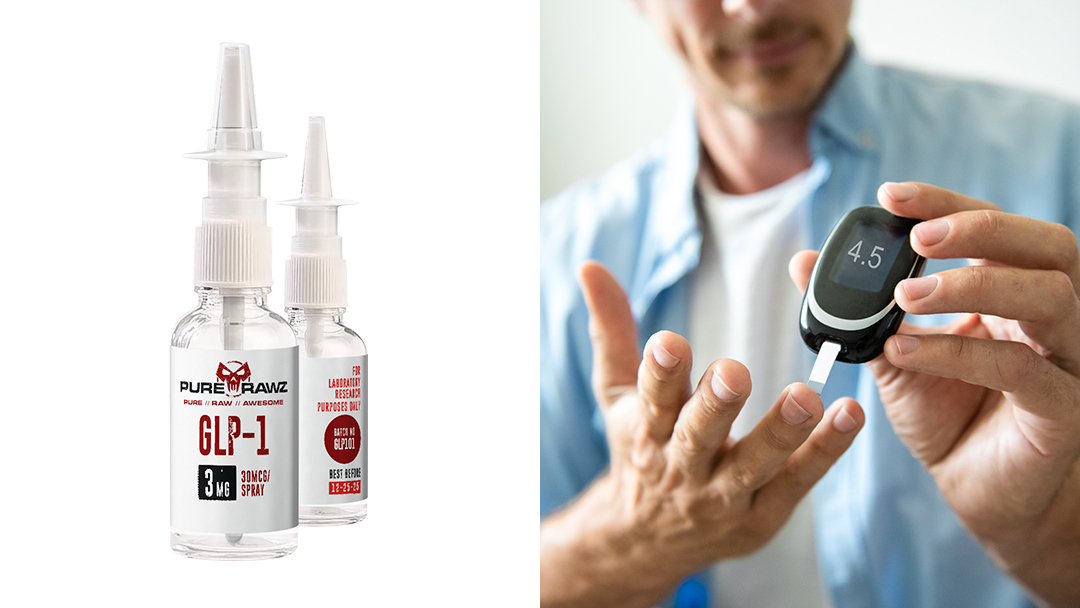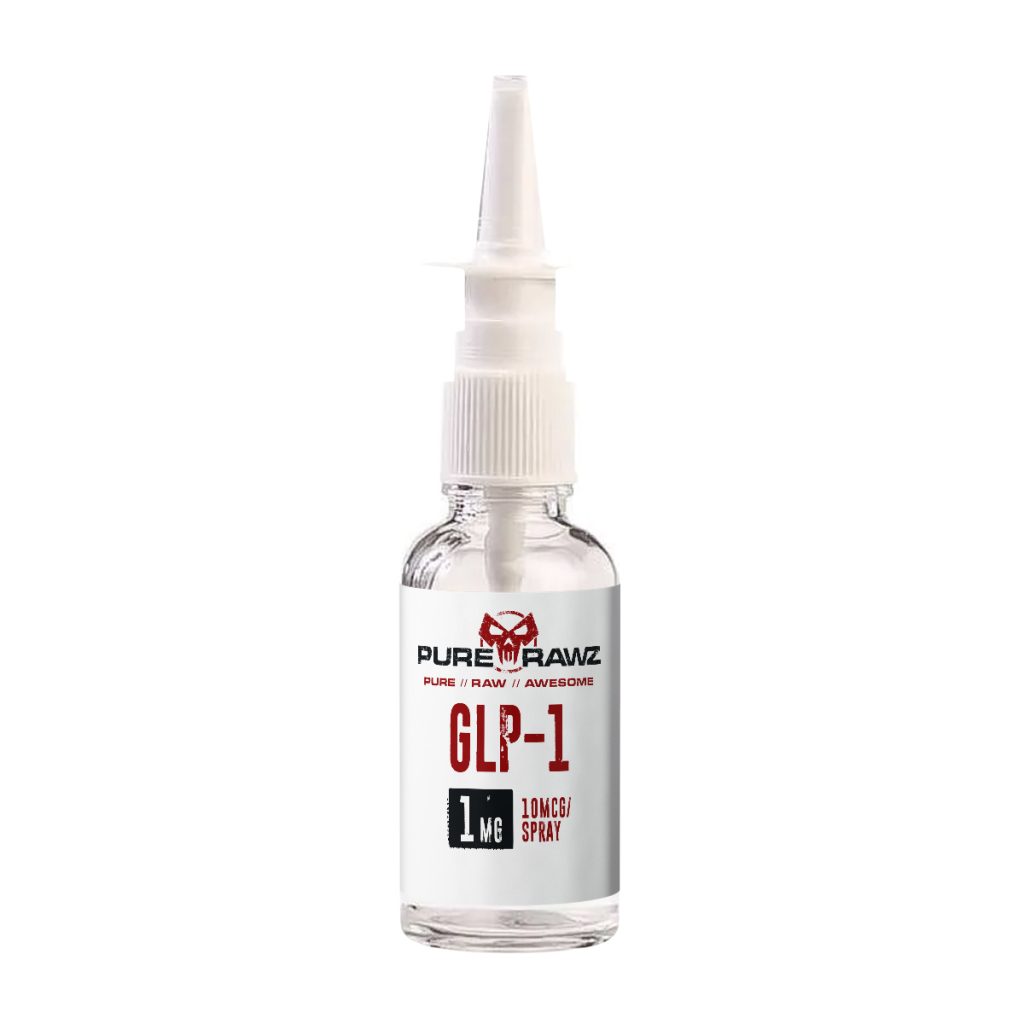Are you prepared to take the first step toward a new, healthier you? Liraglutide is the new trend for people with type 2 diabetes and obesity who are looking to change their lives. It’s the secret to better blood sugar control and the path to a happier, healthier, and more active life. Join the growing number of people who are using liraglutide to improve their health and vitality.
Introduction

Liraglutide, available under the brand names Victoza and Saxenda, is a remarkable GLP-1 agonist. This medication has demonstrated the potential to safeguard beta cells and stimulate their growth in vitro, offering promise for those with diabetes. It achieves this by substituting lysine with arginine at position 34 in the GLP-1 peptide. This innovative development was necessary because natural GLP-1 has a short half-life of just 2 minutes and is swiftly degraded by enzymes. [R][R][R][R]
In individuals with both diabetes and those without, Liraglutide showcases an extended half-life of around 13 hours, and its absolute bioavailability is approximately 55%. Though it offers significant therapeutic benefits, it may be accompanied by some gastrointestinal side effects. Since November 2010, Liraglutide has been an approved treatment for type 2 diabetes. Furthermore, the FDA has approved for its use in chronic weight management for obese patients, broadening its impact on health[R]
Product Information:
Liraglutide is a revolutionary GLP-1 agonist making strides in the healthcare landscape. But what makes it truly stand out is its spray form, a testament to pharmaceutical innovation. By tweaking the GLP-1 peptide, Liraglutide extends its presence in the body, granting a remarkable half-life of roughly 13 hours. The convenience of a spray form isn’t just about ease of use; it’s about ensuring more consistent and effective treatment for diabetes management and weight control. Embracing the power of innovation, the Liraglutide spray form promises a brighter future for those on the journey to better health.
How Does It Work?
Image source: https://pubchem.ncbi.nlm.nih.gov/compound/9811102#section=Structures
GLP-1, short for Glucagon-Like Peptide-1, is a remarkable hormone with a crucial role in regulating our body’s response to food and maintaining stable blood sugar levels. Produced in the intestinal epithelium, GLP-1 is a 30-amino acid peptide hormone derived from the proglucagon gene. Its primary function is to help us digest food efficiently and keep our blood glucose in check.
When we eat, GLP-1 is secreted by specialized cells in the gut in response to nutrients in the food we consume. However, most of this GLP-1 doesn’t get very far in our bloodstream because it’s rapidly broken down, first by an enzyme in the gut, and then further in the liver. Nonetheless, the small amount that survives plays a crucial role in maintaining our health. It binds to receptors in various organs, including the pancreas, gut, brain, heart, kidney, and adipose tissue.
In the pancreas, GLP-1 enhances the release of insulin in response to elevated blood glucose levels, helping to control our post-meal blood sugar. Simultaneously, it inhibits the release of glucagon, another hormone that tends to raise blood sugar. GLP-1 also slows down the movement of food through the gastrointestinal tract and delays the emptying of the stomach, leading to a more gradual release of nutrients. These combined actions result in more stable post-meal blood sugar levels, regardless of the meal’s size and composition. Furthermore, GLP-1 influences our sense of fullness, contributing to a reduction in appetite and food intake.[R
GLP-1 (Liraglutide) – Benefits:

GLP-1 (Liraglutide) has undergone extensive clinical research and randomized clinical trials, exploring its potential health benefits, especially in the context of diabetes and contradicting weight gain in obese patients. We’ve compiled some of the benefits below:
1. Body Weight Reduction
Liraglutide, a GLP-1 receptor agonist, has emerged as a solution in the battle against obesity. In a double-blind clinical trial involving 3,731 obesity patients, body weight compared after daily administration of Liraglutide showcased its potential to not only reduce body weight but also enhance metabolic control. A remarkable 63.2% of patients experienced losing weight of at least 5%, with 33.1% achieving an even more impressive weight loss exceeding 10%.[R]
Further emphasizing its efficacy, a study prescribing Liraglutide 3.0 mg to 115 patients, regardless of the dose received, revealed significant results. After four months, the median body weight had decreased by 9.2%. Even patients who didn’t receive the maximal dose experienced significant weight loss. These findings underscore this weight loss drug has the potential to revolutionize obesity treatment and provide hope for individuals looking to shed excess weight and improve their overall well-being.[R]
2. Diabetes
Liraglutide is showing great promise in Type 2 diabetes management. Research has studied its potential to help individuals with Type 2 diabetes achieve effective glycemic control by stimulating increased insulin secretion when blood glucose levels rise.[R]
In a 52-week placebo-controlled trial involving Type 2 diabetes patients aged 10 to 17, those who received Liraglutide demonstrated significant improvements in glycemic control. Administered at doses of up to 1.8 mg per day, Liraglutide exhibited its potential in managing blood glucose levels over the study’s duration.
Moreover, in another study, the effects of daily Liraglutide administration were closely observed in patients with Type 2 diabetes. A daily dose of 0.6 mg was found to significantly improve fasting plasma glucose levels, with this effect becoming evident after just one week and persisting through eight weeks of treatment. These findings offer hope for individuals with Type 2 diabetes, highlighting Liraglutide’s potential to enhance glycemic control and as weight loss medications [R]
3. Helps Obesity Management
GLP-1 (Liraglutide) is a superhuman agent in the management of diabetes and obesity. It supports the regulation of blood sugar levels and promotes weight loss. How does it function? GLP-1 drug interactions stimulate the production of insulin, which regulates blood sugar. Nevertheless, an intriguing aspect to consider is that natural GLP-1 is only present in our bodies for a few minutes.
Research has indicated that the action of GLP-1 analogs, such as Liraglutide, may impede the rate at which food exits the stomach. This results in a reduced occurrence of postprandial glucose excursions, thereby facilitating the management of diabetes. In addition, GLP-1 analogs have the potential to suppress appetite and cravings, which is a significant advance in the fight against obesity. [R]
Nevertheless, an exception exists. The effect of GLP-1 analogs on delayed gastric emptying is variable and contingent upon the specific drug type and duration of administration. Long-acting versions or extended use of short-acting drugs may not impede gastric emptying to the same extent as short-acting versions. In general, however, GLP-1 (Liraglutide) is a potent management tool for obesity and diabetes, providing optimism for a more health-conscious future.
4. Reduce Risk of Cardiovascular Diseases
In a double-blind trial, researchers set out to determine the cardiovascular effects of Liraglutide when added to standard care for individuals with type 2 diabetes. The results of this study revealed a wealth of astonishing benefits. Patients who received Liraglutide experienced a significantly reduced risk of death from cardiovascular causes, nonfatal myocardial infarction, or nonfatal stroke. This news is not only encouraging but downright remarkable. With a median follow-up of 3.8 years, it was found that fewer patients in the Liraglutide group experienced these life-threatening events, making a strong case for its efficacy.
You might be interested in our other articles.
Best GHRP 2 Nasal Spray Reviewed 2024
by Dr. Frederick J. Marshall
November 21, 2023
Best BPC-157 + TB-500 Nasal Spray Reviewed 2024
by Dr. Frederick J. Marshall
November 15, 2023
Liraglutide’s potential benefits go beyond its ability to control blood sugar levels. It represents a lifeline for patients, safeguarding their hearts from potential harm. While it’s crucial to acknowledge that every medical intervention has potential side effects, Liraglutide’s most common adverse events were gastrointestinal, and the incidence of pancreatitis was nonsignificantly lower in the Liraglutide group compared to the placebo.[R]
5. Impact on Weight and Bone Density
An investigation was conducted to examine the correlation between Liraglutide and bone health, revealing several significant benefits for individuals with type 2 diabetes. First, let’s talk about bone resorption. The study examined a marker called C-terminal telopeptide of type 1 collagen (CTX), which is a measure of bone resorption. Surprisingly, both the group receiving Liraglutide treatment and the placebo group exhibited an increase in CTX levels over the 26 weeks, but the key takeaway is that this increase was not significantly different between the two groups. In simpler terms, Liraglutide didn’t worsen bone resorption compared to the placebo. However, the real eye-opener is the impact on weight and bone density. Patients treated with Liraglutide experienced weight loss early in the study, an average of 3.8 kg, which remained stable throughout. This is noteworthy because excess weight can strain bones. Moreover, these patients also showed lower levels of plasma P1NP, a marker of bone formation, during the initial phase of the study, which later rebounded. In contrast, the placebo group did not exhibit significant changes in either baseline body weight or P1NP levels.
Most remarkably, when focusing on bone mineral density (BMD), the group on placebo saw a decrease in BMD at the total hip, whereas the Liraglutide-treated group did not experience any significant changes. This points to Liraglutide’s potential to preserve hip bone mineral density, a pivotal aspect of bone health. In a world where diabetes management is complex, these findings mark a significant step towards a better quality of life.[R]
6. Battles Alcohol Use Disorder (AUD)
Recent research has shown a link between GLP-1 and Alcohol Use Disorder (AUD). What’s most interesting is the potential for GLP-1 to combat AUD effectively.
The study revealed a strong association between genetic variations in GLP-1 and AUD. GLP-1 also seems to influence alcohol cravings. Post-hoc analysis of the research demonstrated that GLP-1 risk alleles had a tangible effect on intravenous alcohol self-administration. Functional MRI scans provided insights into how GLP-1 and reward cues interplay within the brain. Additionally, stimulating the GLP-1 receptor in a mouse model led to a significant reduction in alcohol consumption. These findings open the door to exploring the GLP-1 receptor as a potential therapeutic target for AUD, particularly in a genetically identified subpopulation of patients.[R]
With AUD continuing to be a significant public health issue, GLP-1 emerges as a potentially potent therapeutic agent against this disorder, providing renewed optimism to individuals who daily grapple with AUD.
7. Improving Cardiovascular Health
Liraglutide, originally designed to manage type 2 diabetes, has revealed a potential to improve cardiovascular health in individuals both with and without diabetes.
In a study, Liraglutide has been shown to enhance cardiovascular well-being. Long-term use, up to 1.8 mg, demonstrated a significant reduction in cardiovascular disease (CVD) and all-cause mortality risk among patients with type 2 diabetes at high CVD risk. But the real game-changer is its short-term impact on obese individuals without diabetes. In a 5-week, high-dose Liraglutide study involving obese patients without type 2 diabetes, researchers discovered a series of positive changes. Key cardiovascular markers like total, free, and remnant cholesterol saw reductions, independent of weight loss. Moreover, there was a decrease in the number of small and medium-sized LDL particles and their total lipid concentration, indicating a lower risk of atherosclerosis. But that’s not all. Liraglutide’s influence extended beyond lipids. Tyrosine levels decreased, behenic acid levels increased, and concentrations of activin AB and follistatin significantly decreased. These changes, though short-term, suggest a more heart-healthy lipid-lipoprotein profile and hormonal balance, leading to a lower risk of heart disease and atherosclerosis. [R]
Side Effects:

GLP-1 (Liraglutide) is a pharmaceutical agent predominantly employed in the management of type 2 diabetes. Liraglutide, a glucagon-like peptide-1 (GLP-1) receptor agonist, reduces glucagon production and increases insulin secretion, thereby assisting in the reduction of blood sugar levels. It is crucial to know potential side effects when utilizing any medication, as they may differ among individuals and are contingent upon a multitude of factors, such as dosage and personal health circumstances. Injectable adverse effects may consist of gastrointestinal manifestations such as nausea and vomiting, in addition to potential complications like pancreatitis and tachycardia, the clinical significance of which remains uncertain. [R] The safety of Liraglutide was generally acknowledged in clinical trials. For specific side effect information regarding developments or new formulations, it is advisable to seek guidance from a healthcare professional or consult the most recent medical literature.
Is GLP-1 (Liraglutide) legal?
Liraglutide, a pharmaceutical agent that functions as an agonist of the glucagon-like peptide-1 (GLP-1) receptor, is a prescription drug that has obtained medical approval in numerous nations, including the United States and several European countries. In addition to its primary indications, it is occasionally employed for weight management.
Nevertheless, amendments to laws and regulations and regulatory decisions may cause a shift in the legal standing of medications over time. To ascertain the present legal standing of Liraglutide or any other medication, it is advisable to seek guidance from a qualified healthcare practitioner, chemist, or the appropriate regulatory body in your jurisdiction. To guarantee their safe and appropriate utilization, it is critical to adhere to the guidance and obtain a prescription from a qualified healthcare professional before administering any medications.
Suggested Dose:
Liraglutide is used primarily to treat type 2 diabetes and obesity. The suggested dose of liraglutide can vary depending on the specific condition being treated and individual patient characteristics. It’s important to follow the prescribing healthcare professional’s recommendations and adhere to the prescribed dose. The recommended doses depend on the condition:
For diabetes (Type 2):
Start with a low dose (0.6 mg) and gradually increase to 1.2 or 1.8 mg once daily, as advised by your doctor.
For obesity:
Begin with a low dose (0.6 mg) and gradually increase to 1.2 mg daily. The maintenance dose is usually 3.0 mg daily.
Always follow your doctor’s instructions and do not change the dose on your own. If you have questions or concerns, discuss them with your healthcare provider.
Where to buy GLP-1 (Liraglutide) Online
To buy GLP-1 (Liraglutide) nasal spray, PureRawz emerges as the ideal destination. As a leading supplier of research chemicals, the online store consistently offers reference materials alongside each product or research chemical in its inventory.

Conclusion:
GLP-1 (Liraglutide) emerges as a promising solution for a healthier, more vibrant future, not only for adults but also for pediatric patients dealing with type 2 diabetes and obesity. This extraordinary medication provides a consistent and convenient treatment option due to its extended half-life and innovative methodology. In addition to facilitating the regulation of blood glucose levels, it exhibits considerable potential for substantial weight loss. GLP-1 (Liraglutide), by its beneficial effects on bone health, potential amelioration of Alcohol Use Disorder (AUD), and positive influence on cardiovascular health, represents a promising prospect for individuals striving to achieve optimal wellness. It is imperative to consistently seek guidance from a healthcare professional regarding the appropriate dosage and personalized recommendations. Become a part of the expanding community of individuals who are embracing the transformative potential of GLP-1 (Liraglutide) to enhance their health and overall well-being.
Within the contemporary healthcare environment, GLP-1 (Liraglutide) emerges as a paradigm shifter. The revolutionary capacity of this substance to regulate diabetes and weight, in addition to its encouraging impact on cardiovascular health, positions it as a transformative force within the healthcare industry. This innovative GLP-1 agonist, presented in a convenient spray formulation, provides a more reliable and consistent track toward enhancing one’s health. As further investigations reveal its diverse advantages—including potential applications in addressing Alcohol Use Disorder and weight loss and diabetes management—GLP-1 (Liraglutide) provides optimism to a multitude of individuals striving for a more robust and health-conscious future. Always remember to consult a healthcare professional for the correct dosage and advice tailored to your specific needs, including blood pressure management.


